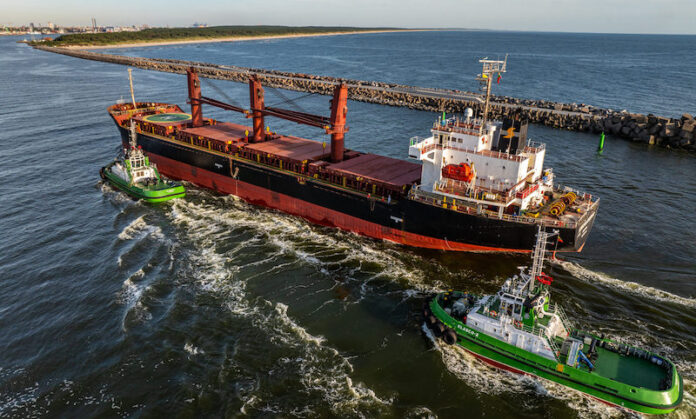In the first half of this year, Port of Klaipeda handled 16.4 million tonnes of cargo. Compared to the same period last year, this year’s volume is up by half a percent. The vast majority of these volumes were Lithuanian import and export cargoes, with road transport being the main mode of transport through the Port of Klaipeda.
“The Port of Klaipeda, despite the storms that have been raging in recent years, has set sail and is sailing into calmer waters. Looking at the first half of this year, Klaipeda has a 37% market share among the Baltic ports, and we are experiencing a stabilising situation in cargo handling. We are analysing the figures and the competitive environment and we expect the next six months to be even more successful for the Port of Klaipeda: the new crop of grain starts, the fertiliser sector is also positive, and the “Independence” has already returned from repair. We hope to maintain the container handling rates, to surpass the 1 million TEU container handling barrier and to be a member of the millionaires’ club for the third year in a row,” says Algis Latakas, Director General of Klaipeda State Seaport Authority.
The most significant influence on the stable cargo performance at the Port of Klaipeda in recent months was the growing cargo of ro-ro (+22% or 539 thousand tonnes), construction materials (+59% or 272 thousand tonnes), scrap metal (+25% or 149 thousand tonnes), timber and forestry products (+40% or 113 thousand tonnes), and fertilisers (+32% or 198 thousand tonnes) transported by ferries. Due to the sanctions in force against Russia and Belarus, the Port of Klaipeda is no longer used for the transhipment of fertilisers, but the fertilisers produced by the Lithuanian fertiliser manufacturers – “AB Achema” and “AB Lifosa” – are loaded here. In January–Junethis year, the volume of this cargo, both in liquid, bulk and packaged form, was 32% higher than in the same period last year. The largest shipments of fertilisers in the first half of the year were to and from the United Kingdom, Germany and Denmark. The number of ships increased, with 2,638 ships (dry bulk carriers, tankers, ferries, cruise ships, small ships, etc.) calling at the port, or 3% more than in the same period last year.
In the first half of this year, compared to the same period last year, container TEU cargo (-7% or 38,213 thousand tonnes), grain (-13% or -262 thousand tonnes), oil products (-7% or -152 thousand tonnes), LNG cargo (-34% or -400 thousand tonnes) dropped, which was mainly due to the departure of the LNG terminal “Independence” for a month-long inspection and repair in the dry dock in Denmark. In May, Port of Klaipeda did not handle any LNG gas at all. The largest LNG cargoes were imported from Norway, the USA and Finland. This year, the number of passengers using the port’s services was 7% lower than last year, with more than 136,000 passengers.
This year’s 7% drop in TEU container cargo was due to several factors: a decline in transit of Ukrainian containers with used cars from the US, the end of car shipments to Belarus due to the new sanctions, and a contraction in Lithuanian industrial exports.
Of the 16.4 million tonnes of cargo handled in the Port of Klaipeda in the first half of this year, the majority of cargo was transported by road (67%), while 23% was transported by rail. The remainder consisted of LNG transported by pipeline and ship-to-ship cargo.
In the first half of this year, the Port of Klaipeda had trade relations with 47 foreign countries. The main shipments were to and from the following countries: Germany (2.8 million tonnes), Sweden (2.6 million tonnes), Poland (1.9 million tonnes), the Netherlands (1.1 million tonnes) and Belgium (0.8 million tonnes). Cargo flows to and from these five countries accounted for 56% of the port’s cargo volumes handled in the first half of this year. The main shipments to and from Germany were ro-ro cargo, containers and agricultural products, while the main shipments to and from Sweden were ro-ro cargo, building materials and containers. With Poland, the largest cargo flows were recorded in containers, petroleum products and fertilisers.
The vast majority (95%) of the cargo handled in the first half of this year in the Port of Klaipeda was Lithuanian import and export goods. Transit accounted for only 5% of freight.
In the first half of this year, “AB Vakaru laivu gamykla” repaired 47 ships, 5 of which were modernisation projects, and “UAB Klaipedos laivu remontas” carried out repairs on 11 medium tonnage ships.



